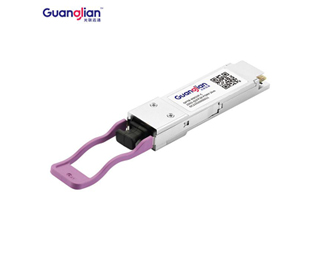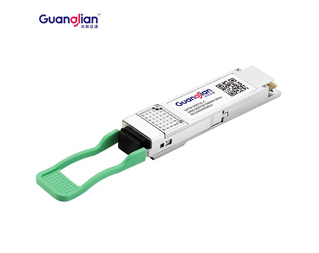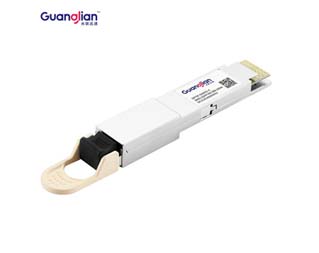Fiber Optic Transceiver also was known as Fiber Optical Transceiver, Optical Module, Optics Module, etc. It is composed of optoelectronic devices, the functional circuit, and the optical interface. the optoelectronic device includes a transmitter and receiver.‘Transceiver’ is a combination of two words, transmitter’ and ‘receiver’. In other words, the fiber optic transceiver comprises both a transmitter and a receiver that are combined and share common circuitry or a single housing.
It is an important part of optical network equipment that has electronic components to condition and encodes/decode data into light pulses and then send them to the other end as electrical signals. To send data as light, it makes use of a light source, such as VSCEL, FP, and DFB laser, which is controlled by the electronic parts, and to receive light pulses, such as Pin, APD, it makes use of a photodiode semiconductor.
100GBASE-QSFP28-LR4-10km Optical Transceiver Module
Fiber Optic Transmitters: LEDs, Fabry-perot (FP) lasers, distributed feedback (DFB) lasers, and vertical-cavity surface-emitting lasers (VCSELs) are the 4 types of sources for the transmitters that can convert the electrical signals into optical signals. They are all tiny semiconductor chips.
Fiber Optic Receivers: The receivers use semiconductor detectors (photodiodes or photodetectors) to convert optical signals to electrical signals. Silicon photodiodes are used for short-wavelength links (650 for POF and 850 for glass MM fiber). Long-wavelength systems usually use InGaAs (indium gallium arsenide) detectors as they have lower noise than germanium which allows for more sensitive receivers. Very high-speed systems sometimes use avalanche photodiodes (APDs) that are biased at high voltage to create gain in the photodiode.
The role of fiber optic transceiver can be simply concluded: Fiber transceiver is a photoelectric conversion device that converts the electrical signal into an optical signal at the transmission side, after the transmission on the fiber optics, the optical signals are transmitted into electrical signals at the receiving side.
In the traditional network, the network cables or coaxial cables are usually used, but the communication bandwidth and signal quality they provide can no longer meet the growing need of customers. While the era of fiber optic networks makes optical switches, SDH equipment, fiber converters, fiber optic multiplexers, and more related fiber optic equipment developed rapidly.
In the works process of this fiber-optic network equipment, the fiber optic transceiver modules are needed to convert the electrical signals via the laser driver to optical ones, and then transmit the optical signals through the optical fibers for a long distance, when the signals arrive at the receiving end, it then is converted into electrical signals through the fiber optic receiver ((Pin-Tia or APD).
100GBASE-QSFP28-PSM4-500m/2km Optical Transceiver Module
Fiber Optic Multiplexer: Common fiber optic multiplexers use 1 x 9 package fiber optic module, some HD multiplexers would use SFP optical modules.
Fiber Optic Converters: 1 x 9 transceiver modules.
Fiber optic network card: 1 x 9, SFP or SFP+ optical modules.
Fiber-optic high-speed ball machine: SFP optical module
The base station: XFP, SFP optical module.
The above is the analysis of several devices using the optical modules. It can be seen that 1 x 9 and SFP optical modules are the most commonly used, the difference between them is that:
1 * 9 optical modules are welded on the device, while the SFP transceiver is hot-swappable.
Guanglian is a leading optical transceiver solution and service provider. Guanglian is dedicated to research, development, manufacture, and market high-speed and high-performance optical transceiver modules and optical components for various ICT applications, such as Datacenters, Telecom Networks, Security Monitoring.
Quick Link to the Fiber Optical Transceiver Supplier.
For more information about optical transceiver solutions, please contact sales@guanglian-tech.com.
100G CFP vs QSFP28: Which One to Choose?
Jun. 11, 2022What Makes the Best Optical Transceiver Module?
May. 27, 2022200G QSFP56 Optical Module Knowledge Full Explanation
Apr. 25, 2022
100G CFP vs QSFP28: Which One to Choose?
Jun. 11, 2022
What Makes the Best Optical Transceiver Module?
May. 27, 2022Copyright ©Guanglian Xuntong Technology Group Co., Ltd. All Rights Reserved | Sitemap
